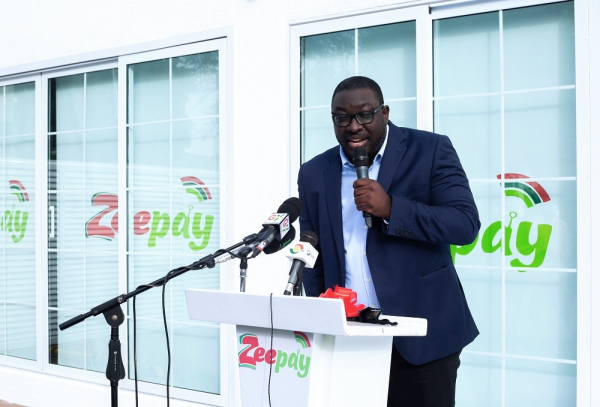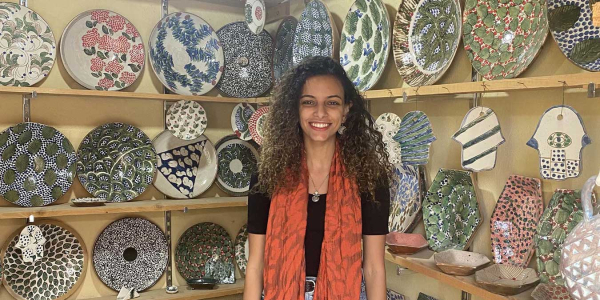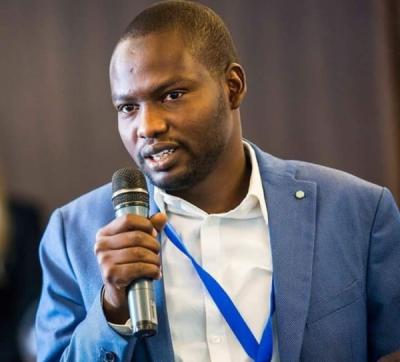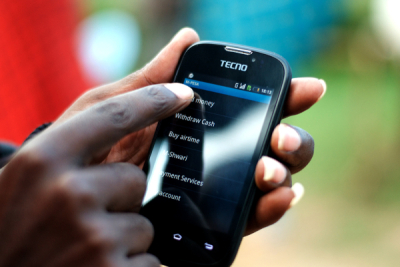The approval comes six months after the Ghanaian fintech startup raised US$10 million from Symbiotics BV and a Mauritian fund.
Ghanaian fintech startup Zeepay recently received the Central Bank of Zambia's approval to operate in Zambia offering users the possibility to directly send funds from their mobile money wallets to over 150 countries.
According to Andrew Takyi-Appiah (photo), co-founder and managing director of Zeepay, the new service, which is the first of its kind in the world, is the result of a partnership with Moneygram International. "Our partnership with MoneyGram is helping to make Africa borderless day by day, and we are excited to be at the forefront of this revolutionary change," he said.
Zeepay operates in more than 25 countries around the world. Since its launch in 2016, it has grown exponentially. In March 2020, it became the first Ghanaian company to secure an Electronic Money Issuer (EMI) license from Bank of Ghana, the Ghanaian central bank.
In August 2022, it raised US$10 million to enter more African markets and support local banks.
Samira Njoya
The solution was launched to boost the visibility of Egyptian handmade items and attract national and international clients for its local users.
Muqbis is an e-commerce solution launched to allow local artisans to showcase their products to an international audience. It was created, in 2021, by the Egyptian startup Muqbis.
To access its services as buyers, users need to visit its web platform where they can browse the various products ranging from pottery, embroidery, and jewelry to artwork and brass work. Once they select the items they need, they can create an account to finalize the purchase or log in if they already have a Muqbis account. As for artisans, they can register for an account that allows them to showcase their products to potential buyers.
On its front page, the solution showcases best sellers, best-rated items, and those with ongoing promotions, boosting the visibility of those items and ultimately sales. Payments can be made either with a banking card or in cash at delivery. However, for the time being, no mobile money solution is available.
Muqbis has a return policy that gives buyers 30 days from the reception date to return any defective items. Its only condition is that the item should be unused and still in the same condition as received. Let's note that in December 2022, the startup behind the solution raised funds to support its expansion.
Adoni Conrad Quenum
The talented and passionate entrepreneur leverages his IT expertise to support local entrepreneurs and help them succeed.
Abdelsalam Safi (photo) is a Chadian social and tech entrepreneur. He is one of the co-founders and CEO of WenakLabs, the first startup incubator in Chad.
His incubator, founded in 2014, claims to be both a media lab and a tech hub that aims to help bridge the digital divide and promote tech entrepreneurship by all means. It also defines itself as a "space of collective intelligence and social innovation" that "defend a horizontal and transparent way of working."
Last January 18, it inaugurated its media lab, which is equipped with all the professional tools that can facilitate audiovisual and digital works and get training in related professions. Some of its equipment enables photo and video shooting, graphic designing, and the production of web TV shows.
" Our media lab is an interdisciplinary research lab where researchers, artists, designers, etc. can work together to leverage ICT potentials to solve problems and identify new opportunities", explained Abdelsalam Safi.
Since February 2020, the tech entrepreneur is the country director of the Chadian chapter of the American business incubator Founder Institute. Since 2006, he is also a member of the nonprofit organization Free Software Foundation.
His professional career began in 2012 when he started teaching system and network administration at the Chadian private school IPNT (Institut Polytechnique de nouvelles technologies). About a year later, he also started teaching Java object-oriented programming at the University Institute of Sciences and Technology of Abeche.
Melchior Koba
According to Mastercard's report "The Future of Fintech-Africa," the number of fintech startups operating in Africa rose 81% between 2019 and 2021. Some of those startups operate outside the law and are deemed predatory. Authorities are now taking measures to make them compliant.
In Nigeria, an additional 106 digital lenders got their approvals to operate from the Federal Competition and Consumer Protection Commission (FCCPC) last Wednesday, January 25. A few days later, on January 30, the Central Bank of Kenya (CBK) licensed 12 fintech startups, raising the number of licensed fintech startups in the country to 22.
"The focus of the engagements has been inter alia on business models, consumer protection, and fitness and propriety of proposed shareholders, directors, and management. This is to ensure adherence to the relevant laws and importantly that the interests of customers are safeguarded, " the CBK indicated in its release announcing the licensing.
In 2022, Kenya and Nigeria took regulatory measures to secure the digital lending landscape following consumers' growing complaints about the various practices, including high-interest rates and the name-and-shame behavior, in that ecosystem. Nigeria even took down more than 50 loan apps from Playstore, according to an interview with FCCPC CEO Babatunde Irukera.
Also, in November 2022, Google informed digital lenders operating in the two countries that starting from January 2023, it would host their app on Playstore only when they submit a genuine business license. "Google has been very supportive, including providing their expert knowledge and experience in offering advice on what works best in achieving laudable regulatory objectives," he said.
Since March 2022, the CBK has received 381 licensing applications. In Nigeria, of the 106 fintech startups that have received their approvals, 65 have received full approval, while the remaining 41 have received conditional approval.
Samira Njoya
The talented entrepreneur combined tech tools and his experience in the event industry to offer an innovative solution to help event specialists in their work.
Haythem Dridi (photo) is the founder of the tech company Millesima Technologies. The Tunisian-born entrepreneur is a Mathematics and Physics graduate from the Faculty of Science of the University of Sfax, Tunisia. He is also a certified project manager.
Millesima Technologies, the startup he manages as the CEO, is a Startupact-certified Tunisian company. It specializes in data and on-demand video streaming. The startup launched in 2021 also offers face-to-face, hybrid and virtual solutions to event specialists.
In late 2022, it raised US$480,000 from private equity firm BH Equity to launch MYVIOO, a digital platform that allows firms and organizations to launch free or paid on-demand video and live-streaming channels that can be used as advertising spaces.
Haythem Dridi's entrepreneurial adventure began with the creation of Millesima Travel and Millesima Events in 2004. Millesima Travel is a licensed Tunisian travel agency specializing in B2B hotel booking and business travel management.
Meanwhile, Millesima Events is an events agency based in Morocco and Tunisia. The agency has already worked with 794 clients and organized 2,596 national, 60 overseas, and 150 virtual and hybrid events.
It is somehow the originator of Millesima Technologies, which was launched to allow it to continue its operations when the coronavirus pandemic forced a cessation of face-to-face events.
Melchior Koba
The solution aims to keep users healthy and prevent some diseases like obesity, diabetes, and asthma, which have recently been on the rise in Africa.
Lifesten Health is a digital solution developed by a Rwandan start-up that allows users to lead a healthy lifestyle. It creates personalized exercise and diet programs for each user.
Users can register on its web platform or via its mobile app (available for Android and iOS devices) and answer several questions to allow the solution to set up a personalized profile. Based on that profile, Lifesten Health creates "daily personalized challenges that involve activities to improve [...] diets, physical activity, and mental wellness."
Recognizing that it takes a lot of discipline to keep up with the challenges, the start-up behind the solution has come up with an incentive system that awards points to be exchanged for goods and services such as medicines, consultations, subscriptions, and even spa treatments at partner companies. Lifesten has also developed a program to encourage employers to enroll their employees to boost their productivity.
In addition, it keeps a frequently-updated blog that discusses wellness, exercise, lifestyle, diseases, and even news related to its development.
Adoni Conrad Quenum
The solution aims to help farmers and fresh produce farmers quickly sell their products while ensuring farm traceability.
Mahaseel Masr is a digital solution that connects farm owners with buyers looking for fresh products. According to Mohamed Abdel Rahman, founder of the startup behind the app, "demand for first-rate fruits and vegetables at competitive prices is showing strong growth, driven by a global rapid population increase and raised digital awareness, in addition to a demanding need for global supply chain stability." Therefore, the solution wants to facilitate secure and reliable transactions while ensuring farm traceability.
Through its Android app, the solution allows buyers and sellers to create their accounts and carry out business transactions. Buyers must type the product they need into the search bar and choose the farms offering such products depending on the location.
Mahaseel Masr claims more than 28,000 member farms and more than a million tons of crops harvested and sold. On Play Store, its Android app has been downloaded more than a hundred times.
Adoni Conrad Quenum
With Moja Ride, he successfully transformed mobility in Côte d'Ivoire, where public transportation is poorly organized.
Jean Claude Gouesse (photo) is an Ivorian entrepreneur and the co-founder/CEO of Moja Ride, a mobility aggregator based in Côte d'Ivoire.
His mobility startup, founded in 2017, connects informal transportation modes on a single platform. It also provides a ticketing platform that allows transport operators, and cab and minibus drivers to track their earnings and offer unsecured car loans all thanks to the Moja Wallet that enables drivers to save and borrow funds and pay for expenses.
The startup has launched a contactless card and QR code payment technology to make it easier for users to pay for their rides. The said users can also buy their tickets online.
Before Moja Ride, in 2016, Jean Claude Gouesse co-founded Bouttic Technologies, which offers business management solutions. Three years earlier, he also co-founded fintech company R.A.T.E.S MONETIC, the brain behind the solution eCash Express, which aims to 'redefine the mobile money revolution through easy-to-use and affordable payment solutions."
Between 2014 and 2015, in Seattle, USA, he participated in Techstars' Startup Weekend, "a three-day program where aspiring entrepreneurs can experience startup life."
Let's note that Moja Ride is among the eleven startups selected to participate in the third cohort of the Africa Startup Initiative Program (ASIP), an acceleration program organized by Startupbootcamp Africa and Telecel Group.
Melchior Koba
DR Congo, which is confident that ICT tools can greatly contribute to emergence, is focused on building a unique digital ecosystem.
DR Congo is currently preparing for the upcoming launch of its intranet project in line with its strategy to digitize and modernize public services. The project was presented by the Ministry of Digital Affairs, last Thursday, after a meeting with various state institutions' representatives.
The national intranet will, among other things, interconnect public institutions in a single network and facilitate access and exchange of information between public services and citizens. It will also facilitate the delivery of public services by federal and local institutions, facilitate communications (email, IP phone, etc.), promote the smooth operation of ministries' and public administrations' websites, and boost the efficiency and effectiveness of the administration by pooling services.
According to Venceslas Katimba, advisor in charge of digital infrastructure and equipment, many things need to be done before the launch of that important digital infrastructure. They include upgrading government websites to required standards since only 21 of the 46 government websites have a web address and just 15 of those addresses use the "gouv.cd" top-level domain name.
Let's note that the various projects underway in the DRC are part of the National Digital Plan - Horizon 2025 which aims to leverage the digital industry for integration, good governance, economic growth, and social progress.
Samira Njoya
The development of broadband access in Africa has contributed to the growth of new professional opportunities, including gaming, which, if properly supported, has the potential to create new entertainment professionals.
Next January 28-29, Africa's young gaming talents will meet at Sofitel Abidjan's congress center for the grand finale of Orange Esport Experience, a pan-African gaming championship organized by Orange Côte d'Ivoire. This year marks the fourth edition of the championship with gamers from fourteen countries.
The participating countries are Benin, Cameroon, Congo, Ivory Coast, Egypt, Ghana, Guinea, Madagascar, Mali, Morocco, the Democratic Republic of Congo, Senegal, Central African Republic, and Sierra Leone. During the 2-day final, the champions of those countries will compete in games such as Street Fighter V, FIFA 2023, eFootball 2023 (ex-PES) and play a demo game on League Of Legends.
According to Orange, gaming is now a professional discipline that helps create many jobs, especially in the field of cybersecurity, artificial intelligence, and open innovation. This is why it is investing in that championship to identify gaming talents.
For Brelotte Ba, deputy director Orange Africa and Middle East, "Africa offers the ideal setting for this growing discipline.
Since 2016, Orange has been investing in the development of Esports with national and international bouts to bring out young gaming talents from the Middle East and Africa. the Orange Esport Experience was launched in 2018, and since then, it is held yearly in Côte d'Ivoire.
In Europe and the United States, gaming is no longer just entertainment. Some professional gamers earn five-figure salaries monthly. In Africa on the other hand, it is a relatively new field. Nevertheless, with the development of broadband access, it is growing quickly, presenting new opportunities to tech-savvy youth.
Muriel Edjo
More...
In urban areas, car parking is a major problem. In Nigeria, a tech company wants to address that problem with its digital solution.
Parkwell is a digital solution developed by a Nigerian startup to help drivers easily book parking spaces around Lagos.
Through its mobile app (available for Android and iOS devices), users can create accounts with their phone numbers, browse the nearest free parking spaces (thanks to GPS technology), and book spaces for set hours or days. If needed, they can extend the number of hours or days they need to continue to use the booked spaces.
According to Parkwell's website, "the total price of a reservation on Parkwell is based on either the hourly or daily rate set by the host, plus the addition of other fees or costs determined by either the Park owner or Parkwell, which might include parking insurance."
Parkwell's services can not be paid in cash. They can be paid either via itheirdigital wallet or via debit/credit cards. Currently, its Android app has been downloaded more than 500 times on PlayStore. Also, the startup has been selected to participate in the third cohort of the Africa Startup Initiative Program (ASIP)’s acceleration program that will take place in Dakar, Senegal. It will thus receive US$18,000 in equity and US$750,000 in credits, services, and in-kind contributions.
Adoni Conrad Quenum
He is a staunch believer in new technologies' capacity to positively change the healthcare industry in Africa. His startup develops powerful algorithms to fill the radiology gap on the continent.
Mustapha Zaidan (photo) is a Ghanaian entrepreneur and the co-founder/CEO of Chestify AI Labs, a startup that aims to revolutionize the African healthcare industry.
His startup, founded in 2020, develops artificial intelligence solutions to solve the most critical health problems in Africa. For instance, it launched radiology algorithms that can increase throughput by automating the analysis and reporting of routine chest X-rays, which are still time-consuming with significant backlogs.
One of the algorithms developed by the start-up is “blue dot”. The latter, which was developed from more than 112,114 images, analyzes and highlights anomalies in images with impressive speed and accuracy.
In 2017, Mustapha launched Obaatanpa (meaning great mother in the Ghanaian dialect Akan), a mobile app developed to reduce the mortality rate. The digital solution gives pregnant and breastfeeding women real-time information about what happens to them during pregnancy and breastfeeding. It also has a menstrual tracker that allows women to know their fertile windows.
In 2019, he also founded FastRx, a healthtech startup that facilitates access to quality medicines.
From October 2015 to August 2021, he Was a software engineer at Kumasi Hive, an incubator and innovation hub "which provides a platform for rapid prototyping of ideas, supporting local Innovations and promoting entrepreneurship."
Let’s note that his startup, Chestify AI Labs, has been selected to take part in the third cohort of the Africa Startup Initiative Program (ASIP) acceleration program.
Melchior Koba
In Africa, the agriculture sector is essential to sustaining the livelihoods of people living in rural areas and providing them with income, but most smallholder farmers do not have access to new technologies. This slows their activities in the digital age where new technologies play key roles in the development of every economic sector.
Heifer International, an international non-governmental organization that fights poverty and hunger in the world, will collaborate with Mastercard to facilitate access to e-payment for farmers in Africa, Mastercard announced in a press release issued on Wednesday, January 25.
Under the partnership, Heifer International and Mastercard will connect millions of smallholder farmers in sub-Saharan Africa to Mastercard's Community Pass, a digital platform that will provide visibility to farmers and make it easier and faster for them to get paid for their products and create a digital presence.
“We remain committed to ensuring that smallholder farmers have the right resources and support required to thrive by leveraging innovation and key partnerships. We firmly believe that smallholder farmers play a foremost role in ensuring the continent’s agricultural food resilience and self-sufficiency," said Adesuwa Ifedi, Senior Vice President for Africa Programs, Heifer International.
Indeed, smallholder farmers play an important role in African economies. According to the African Development Bank (AfDB), agriculture contributes about 30% of the continent's GDP. However, these farmers, mostly living in remote areas often not covered by internet services, cannot easily market their products and conduct digital business transactions.
The partnership between Heifer International and Mastercard aims to advance the digitization and financial inclusion of these farmers. Mastercard's Community Pass will address infrastructure challenges that arise when digitizing rural communities, such as unreliable connectivity, low smartphone ownership, and lack of consistent identification or accreditation.
Samira Njoya
Last October, Nigeria enacted its startup act, joining the list of the few African countries with such acts. It now wants to draw on the experience of countries that have already implemented such acts to develop its ecosystem.
Since Monday, January 23, a delegation of the Office For Nigerian Digital Innovation has been carrying out a working visit in Tunis, Tunisia, at the invitation of the Japan International Cooperation Agency (JICA). The visit aims to let the representatives explore the Tunisian startup ecosystem and learn how public and private actors collaborate to develop the said ecosystem.
According to the members of the delegation, it is important to learn from the Tunisian experience that could be beneficial for Nigeria during the implementation of the Nigeria Startup Act, enacted on October 19, 2022. "We came to learn from the experiences of the actors in the Tunisian ecosystem throughout the pre-and post-implementation phases of the Startup Act," said Fuwa Naonobu, the JICA consultant accompanying the Nigerian team.
The delegation led by Oswald Guobadia Osaretin, Senior Special Assistant (Digital Transformation) to the President of the Federal Republic of Nigeria, met with officials of the Tunisian Ministry of Technology and Communications. In coordination with the JICA office in Tunisia, the delegation also met with several start-ups and accelerators such as Smart Capital, Africinvest, Flat6labs, Technopole El Ghazala, and Instadeep.
It should be noted that the working visit is part of the NINJA project (Next Innovation with Japan) launched by JICA to provide comprehensive and tailored support to entrepreneurs at different stages of development. The project, which covers 19 African countries, is launched to encourage the creation of innovative startups.
Samira Njoya














